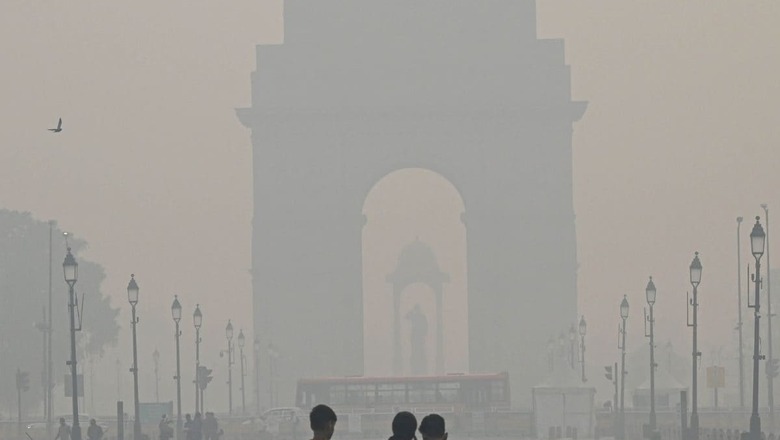
views
In the unrecognized settlements of Delhi, including Gokulpuri, Bhalaswa, Nandnagri, and Bakkarwal, a commendable initiative is underway to combat air pollution, led by empowered women trained by the Mahila Housing Trust (MHT) and Help Delhi Breathe.
Serving as AQI ambassadors armed with portable air quality monitors, individuals like Mumtaz Ben, 49, a dedicated CAG member in the Sawda community, play pivotal roles. Mumtaz, a leader in her mandal, actively participates in MHT’s training sessions on water, sanitation, climate change, air pollution, and land rights. Her ability to motivate and educate fellow community members, coupled with her strong engagement with government stakeholders, amplifies the impact of the awareness campaign.
Similarly, Jarina Ben, 46, an experienced AQI ambassador in the Sawda community, tirelessly advocates for community improvement through engagement with government departments and collaborative efforts with women in her community.
Saroj Ben, 39, an AQI ambassador in the Bakkarwala community, not only raises awareness on air pollution but also extends her efforts to address its impact on construction workers. Leading her Mandal, Saroj inspires other women in her community to actively contribute to the enhancement of their living environment. Together, these women exemplify the transformative power of grassroots initiatives in addressing pressing environmental issues.
1. Can you elaborate on the specific training provided to these women ambassadors?
Mahila Housing Trust works with the community in Bakkarwala, Sawda Gehra, Gokulpuri, Nand Nagri and Bhalaswa areas in New Delhi. The residents of these areas are primarily employed in the informal sector – from construction workers, daily wagers or are self-employed.
In the trainings, women leaders are told about air pollution and it’s impacts on health, equipping them with practical steps to lessen it’s health impacts (tips to improve indoor air quality, ventilation, switching from chulha to gas etc). The training also equips them in the use of small, handheld AQI monitors and reading and recording this data. By use of this device, the trained AQI ambassadors are able to engage others in their community and neighbourhood on the issue, and through it demonstrate the impact of polluting activities in real time.
Under this initiative, women AQI ambassadors are also being given knowledge on government social protection and welfare schemes. They take this knowledge forward and facilitate access to these schemes by helping update records, or getting ID cards made.
2. In what ways have the AQI ambassadors been successful in raising awareness about pollution within their respective communities?
Since the beginning of the initiative, more women have joined the campaign and the awareness drives and signed up from their communities. Women recognise that air pollution causes illnesses in their families – from young children to elderly causing shortness of breath, rashes, allergies and cardiovascular issues.
Equipped with portable AQI devices, the women could report on air pollution levels in their local area and share tangible proof of the dangerous levels of air pollution they were experiencing. These women also learned how to use the ‘Green Delhi’ App, an application that allows citizens to report instances of pollution to the Delhi government.
In sites like Bhalaswa, which is a landfill where the majority of the residents are involved in waste segregation and recycling, the challenges caused by the polluted environment are heightened. People are actively seeking ways to improve the air quality around them for the health of their family.
3. Could you share specific examples of how Mumtaz Ben, Jarina Ben, and Saroj Ben have a visible impact within their communities?
AQI ambassadors have been instrumental in bringing positive change in their communities, many times they go door to door raising awareness and solving issues in their neighborhoods. Anecdotal, they have shared that they go with their AQI monitors to construction sites to demonstrate how high the pollution is, using that as a means to speak to the contractor/employer about protective measures for workers like sprinkling water, green cloth cover for debris etc. In winters, they also speak to people about garbage/scrap burning, and encourage them to find other low-cost thermal heating solutions. Women have shared how they have encouraged people in their communities to give up chulha in favour of gas by explaining and demonstrating indoor pollution levels to them.
Some women now leave their children, and not take them with them to construction sites leave them with neighbours, nearest aanganwadis, etc
4. What are the different challenges the women ambassadors faced in their efforts to raise awareness or combat pollution in the context of informal settlements?
People employed in the informal sector face multiple vulnerabilities due to the nature of their jobs, from precarious income streams, no job security to ill impacts of working in often hazardous conditions. These people also contribute the least to climate change, but are most impacted by weather extremities and pollution. Health and livelihood are good entry points to engage with the community and with decision makers on making tangible improvements for citizens. People often share how they want to move away from polluting activities like garbage burning to stay warm or adopt gas in place of chulha but are unable to as these can be expensive for them.
One of the biggest challenges is that women from construction sites feel unable to speak up to improve conditions at the site for fear of losing their jobs. Through awareness initiatives, the community is energized to find solutions that work for them – such as engaging with contractors about protective measures at construction sites and accessing govt protective schemes (like e-shram, mother and child welfare schemes etc)
5. Is there a tangible difference in the pollution?
The initiative is working with the most impacted audiences of air pollution, we might not be able to show direct reduction in pollution, however, the communities articulate the sources and advocate for solutions. For example: the community believes that the construction sites shouldn’t be banned, as it leads to loss of wages for workers. Instead vehicular emissions can be reduced, public transport can be promoted and construction sites can be made cleaner.
In informal settlements, garbage burning, limited access to proper ventilation, and lack of green spaces were identified as closely linked to issues of air pollution. Women started using government platforms to engage and report local issues. The Delhi Government’s Green Delhi app was a welcome step: many women reported solid waste management needs to alert authorities to pollution issues for faster resolution.
The biggest change has been in how women are now coming together to voice their needs, in making demands for better workplaces or waste disposal practices. As steady income and livelihood remains a priority for them, they highlight how construction bans impact them and instead speak of measures to control air pollution.
6. How do the ambassadors connect their communities to government health and social protection schemes and what has been the response from government stakeholders?
As part of the awareness initiative, government health schemes that were most relevant to this audience were mapped. Information on accessing these schemes was designed in a simple brochure for AQI ambassadors to use as an aid in their talks with community. They give information on how to access the schemes, documents required and where to access the schemes from. In many cases, they have also supported in getting official ID records updated (as in case of Aadhar, e–shram etc)
7. Are there plans to expand this initiative to other informal settlements?
We are currently working with the community in Bakkarwala, Sawda Gehra, Gokulpuri, Nand Nagri and Bhalaswa areas in New Delhi with AQI ambassadors. Through public art events, the Help Delhi Breathe and Mahila Housing Trust initiative will also engage with people in Kathputli Colony, Geeta Nagar and Nehru Nagar. The initiative has also had a steady presence in Delhi’s Raahgiri Days. Help Delhi Breathe is also working with community based organisations, Bucketlist and CSEI to run awareness drives and door to door information campaigns, which aims to reach 1500 people.
8. What kind of overall impact is expected from this initiative?
The overall impact is geared towards raising public awareness, enabling people from the informal sector to voice their needs and enabling access to government social welfare schemes through community engagement. The biggest change has been in how women are now coming together to voice their needs, in making demands for better workplaces or waste disposal practices. As steady income and livelihood remains a priority for them, they highlight how construction bans impact them and instead speak of measures to control air pollution.



















Comments
0 comment